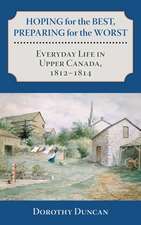Jonathan Fisher of Blue Hill, Maine: Commerce, Culture, and Community on the Eastern Frontier
Autor Kevin D. Murphyen Limba Engleză Hardback – 14 iul 2010
This book examines the life of Jonathan Fisher (1768–1847), a native of Braintree, Massachusetts, and graduate of Harvard College who moved in his late twenties to Blue Hill, Maine, where he embarked on a multifaceted career as a pioneer minister, farmer, entrepreneur, and artist. Drawing on a vast record of letters, diaries, sermons, drawings, paintings, and buildings, Kevin D. Murphy reconstructs Fisher's story and uses it to explore larger issues of material culture, visual culture, and social history during the early decades of the American republic.
Murphy shows how Fisher, as pastor of the Congregational church in Blue Hill from 1796 to 1837, helped spearhead the transformation of a frontier settlement on the eastern shores of the Penobscot Bay into a thriving port community; how he used his skills as an architect, decorative painter, surveyor, and furniture maker not only to support himself and his family, but to promote the economic growth of his village; and how the fluid professional identity that enabled Fisher to prosper on the eastern frontier could only have existed in early America where economic relations were far less rigidly defined than in Europe.
Among the most important artifacts of Jonathan Fisher's life is the house he designed and built in Blue Hill. The Jonathan Fisher Memorial, as it is now known, serves as a point of departure for an examination of social, religious, and cultural life in a newly established village at the turn of the nineteenth century. Fisher's house provided a variety of spaces for agricultural and domestic work, teaching, socializing, artmaking, and more.
Through the eyes of Jonathan Fisher, we see his family grow and face the challenges of the new century, responding to religious, social, and economic change—sometimes succeeding and sometimes failing. We appreciate how an extraordinarily energetic man was able to capitalize on the wide array of opportunities offered by the frontier to give shape to his personal vision of community.
Murphy shows how Fisher, as pastor of the Congregational church in Blue Hill from 1796 to 1837, helped spearhead the transformation of a frontier settlement on the eastern shores of the Penobscot Bay into a thriving port community; how he used his skills as an architect, decorative painter, surveyor, and furniture maker not only to support himself and his family, but to promote the economic growth of his village; and how the fluid professional identity that enabled Fisher to prosper on the eastern frontier could only have existed in early America where economic relations were far less rigidly defined than in Europe.
Among the most important artifacts of Jonathan Fisher's life is the house he designed and built in Blue Hill. The Jonathan Fisher Memorial, as it is now known, serves as a point of departure for an examination of social, religious, and cultural life in a newly established village at the turn of the nineteenth century. Fisher's house provided a variety of spaces for agricultural and domestic work, teaching, socializing, artmaking, and more.
Through the eyes of Jonathan Fisher, we see his family grow and face the challenges of the new century, responding to religious, social, and economic change—sometimes succeeding and sometimes failing. We appreciate how an extraordinarily energetic man was able to capitalize on the wide array of opportunities offered by the frontier to give shape to his personal vision of community.
Preț: 374.82 lei
Nou
Puncte Express: 562
Preț estimativ în valută:
71.72€ • 75.08$ • 59.34£
71.72€ • 75.08$ • 59.34£
Carte disponibilă
Livrare economică 15-29 martie
Livrare express 01-07 martie pentru 34.95 lei
Preluare comenzi: 021 569.72.76
Specificații
ISBN-13: 9781558497436
ISBN-10: 1558497439
Pagini: 336
Ilustrații: 55 color illus.
Dimensiuni: 156 x 235 x 28 mm
Greutate: 0.51 kg
Ediția:First Edition
Editura: University of Massachusetts Press
Colecția University of Massachusetts Press
ISBN-10: 1558497439
Pagini: 336
Ilustrații: 55 color illus.
Dimensiuni: 156 x 235 x 28 mm
Greutate: 0.51 kg
Ediția:First Edition
Editura: University of Massachusetts Press
Colecția University of Massachusetts Press
Notă biografică
Kevin D. Murphy is professor of art history at the Graduate Center of the City University of New York.
Recenzii
"A fresh interpretive view of a prolific and self-conscious leader on the Eastern Frontier of Maine during the early national period. Kevin Murphy's ability to link Jonathan Fisher into a larger discussion of the vernacular landscape and changing social relationships makes this study compelling reading."—Edward S. Cooke, Jr., author of Making Furniture in Pre-Industrial America: The Social Economy of Newtown and Woodbury, Connecticut
"This rich and intimate account, in many ways an anthropology of spaces as much as a history of people, provides a new window on the past. Jonathan Fisher not only gives us a new perspective on the Blue Hill parson and his environment but also pioneers a new way of looking at history."—New England Quarterly
"Although less well known than many other fathers, Jonathan Fisher, a Congregational minister of Blue Hill, Maine, had a major impact on the settling of the northeastern United States. In this scholarly book, Kevin D. Murphy, a professor of art history at the Graduate Center of the City University of New York, examines the eastern frontier through the prism of Fisher, a Harvard graduate and dynamic artisan whose skill as an architect, surveyor, decorative painter, poet, and furniture maker helped to transform the settlement of Blue Hill into a thriving port community. Replete with photos, blueprints, maps, documents, and paintings, the book sheds light on the larger issues of material and visual culture, as well as the social history of the early republic."—Art + Auction
"Kevin Murphy, working at the intersection of literary biography and material culture studies . . . provid[es] economic and social contextualization for Fisher's intellectual and material output. In the process, he recovers the web of familial and community relationships that at once motivated and facilitated Fisher's endeavors."—Journal of the Early Republic
"This deeply researched and highly original volume places the house built by Jonathan Fisher in Blue Hill, Maine, at the center of a rich assessment of preindustrial life on the eastern frontier of the expanding early American republic. Kevin Murphy should be congratulated on crafting an enormously engaging and deeply caring assessment of Jonathan Fisher and his world. Material culture specialists and all those who care about how we assess the built landscape should read this book and then directly engage Fisher's legacy by visiting his stunningly maintained house."—Buildings Landscapes
"Drawing on the artifactual sources evident in Fisher’s drawings, restored former home, and the larger village of Blue Hill as the foundation of his 'materialist analysis,' Murphy has skillfully constructed a micro-history that is simultaneously biographical and cultural. We not only encounter the man Jonathan Fisher, but the community he helped to shape."—Maine History
"This rich and intimate account, in many ways an anthropology of spaces as much as a history of people, provides a new window on the past. Jonathan Fisher not only gives us a new perspective on the Blue Hill parson and his environment but also pioneers a new way of looking at history."—New England Quarterly
"Although less well known than many other fathers, Jonathan Fisher, a Congregational minister of Blue Hill, Maine, had a major impact on the settling of the northeastern United States. In this scholarly book, Kevin D. Murphy, a professor of art history at the Graduate Center of the City University of New York, examines the eastern frontier through the prism of Fisher, a Harvard graduate and dynamic artisan whose skill as an architect, surveyor, decorative painter, poet, and furniture maker helped to transform the settlement of Blue Hill into a thriving port community. Replete with photos, blueprints, maps, documents, and paintings, the book sheds light on the larger issues of material and visual culture, as well as the social history of the early republic."—Art + Auction
"Kevin Murphy, working at the intersection of literary biography and material culture studies . . . provid[es] economic and social contextualization for Fisher's intellectual and material output. In the process, he recovers the web of familial and community relationships that at once motivated and facilitated Fisher's endeavors."—Journal of the Early Republic
"This deeply researched and highly original volume places the house built by Jonathan Fisher in Blue Hill, Maine, at the center of a rich assessment of preindustrial life on the eastern frontier of the expanding early American republic. Kevin Murphy should be congratulated on crafting an enormously engaging and deeply caring assessment of Jonathan Fisher and his world. Material culture specialists and all those who care about how we assess the built landscape should read this book and then directly engage Fisher's legacy by visiting his stunningly maintained house."—Buildings Landscapes
"Drawing on the artifactual sources evident in Fisher’s drawings, restored former home, and the larger village of Blue Hill as the foundation of his 'materialist analysis,' Murphy has skillfully constructed a micro-history that is simultaneously biographical and cultural. We not only encounter the man Jonathan Fisher, but the community he helped to shape."—Maine History











